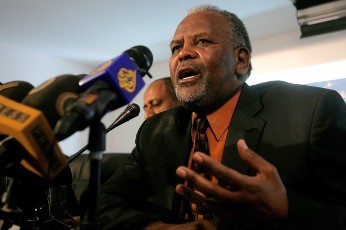North and South Sudan reviewing latest proposal by AUHIP on oil dispute
January 26, 2012 (KHARTOUM) – The African High Level Implementation Panel (AUHIP) mediation team tabled new proposals for the negotiating teams from Khartoum and Juba in a new bid to break the long standing deadlock over the issue of oil transit fees.

Khartoum is insisting on no less than $32 per barrel of oil which Juba vehemently rejects calling it excessive compared to international norms.
On Tuesday AUHIP suggested a temporary arrangement that lasts for a month and a permanent one by which South Sudan pays a specific amount of money that covers the period from 9 July 2011 until December 2014.
The head of the economic committee within Sudan’s delegation Saber Mohamed al-Hassan spoke favourably of the new AUHIP initiative saying it is better than the previous ones but refused to release its exact details.
Al-Hassan flew to Khartoum for consultations with officials there and is expected to return to Addis Ababa on Friday to rejoin the negotiations.
The Sudanese foreign ministry spokesperson Al-Obeid Marwih told reporters that he expects the responses to the new proposals to be submitted today on its temporary and permanent portions.
The president of Sudan Omer Hassan al-Bashir is expected to hold a summit in Addis Ababa on Friday with his southern counterpart Salva Kiir along with Ethiopian prime minister Meles Zenawi and Kenyan president Mwai Kibaki.
Marwih said that it is likely that the summit will result in an agreement being signed before the end of this negotiation round on Saturday.
Tensions between Khartoum and Juba escalated further after Juba decided last week to suspend oil production in retaliation for what it said was stealing by Sudan of its crude oil passing through pipelines on its territories to export terminals in the Red Sea.
Khartoum defended its decision to confiscate South Sudan’s oil, saying Juba has failed to pay transit fees since the south seceded from Sudan in July of last year. Sudanese officials say the arrears amount to almost $1 billion.
In a related issue the Sudanese oil ministry denied assertions made by some analysts that the halting of oil production by South Sudan will damage the pipelines due to its heavy nature.
The Director of the general administration of oil supply and marketing of Azhari Baspar told the government-sponsored Sudanese Media Centre website that Sudan does not rely for its oil derivatives from oil produced in South Sudan. He noted that the refineries in and Khartoum and al-Obaid depend on the Nile Blend light crude.
(ST)
